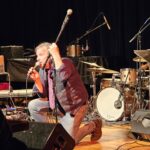Photos by Laura Carbone
This most iconic of the blues festivals could only be set in the city where modern blues was born.
Chicago blues came up from the South with “The Great Migration” and the flood of 1932, which sent blacks up the Mississippi river to work in the North. They bought their music—the blues— and urbanized it, electrified it, and made it commercial. From buskers on Maxwell Street to the black clubs on the Southside , the blues emerged, modernized as we know it today. There could not be a more fitting place to hold a free blues festival than this great city.
Chicago-based record labels such as Cobra, Delmark, Chess and Alligator produced records which then bought Chicago blues to the rest of the world. Out of Chicago came many notable blues musicians: men like Muddy Waters, Howling Wolf, Willie Dixon, Koko Taylor, Buddy Guy, Magic Sam, Elmore James and Junior Wells. Their modern-day contemporaries can still be found in the blues clubs around town.
Set on the Chicago lakefront in Grant Park, the Chicago Blues Festival is now the largest free blues festival in the world. For three days, more 500,000 blues fans coalesce around five stages to make Chicago “The Blues Capital of the World” for the 31st year in a row.
After the festival grounds shut down for the night, the blues continues into the morning hours with clubs like Buddy Guy’s Legends, Rosa’s, Halston Mines, Blues Chicago and the new Motor Row Brewing Company. One can see the contemporary blues artists like John Primer or dream collaborations such as B.B. King’s daughter, Shirley King, belting out the blues with the son and granddaughter of Willie Dixon, all backed on harmonica by the son of Cary Bell. In addition, a special photo exhibit of “Women of the Blues: A Coast to Coast Collection” at The Firecats Gallery honored blueswomen past and present.
The final day of the 2016 festival offered Diunna Greenleaf, Ronnie Earl and Eddie Clearwater; then the Windy City closed the festival with an all-star tribute to one of its remaining living blues legends, Otis Rush. Otis was side stage, watching on as Michael Ledbetter, Mike Welch, Diane Blue, Billy Flynn, Bob Stroger, Abb Locke, Eddie Shaw and Ronnie Earl, among others, performed classic songs such as “I can’t Quit you Baby” and “Right Place, Wrong Time.”
Willie Dixon’s family continues with its Blues Heaven Foundation on the site of Chess Records, and the Jazz Record Mart echoes the past of Delmark Records. In Chicago, the blues thrives, and puts on one helluva show in Grant Park.
—Laura Carbone





























Be the first to comment!